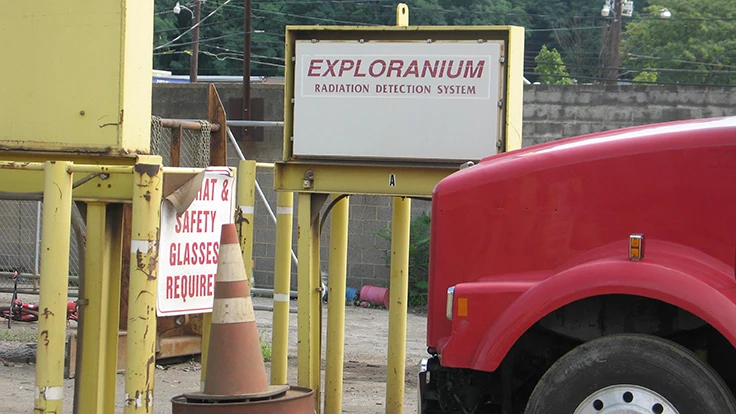
Environmental agencies in two states have determined that scrap contaminated with low levels of radiation was shredded at a PSC Metals facility in Beaver Falls, Pennsylvania. Some of the scrap was later shipped to Ohio and triggered readings from radiation monitors at three facilities there.
The Ohio Department of Health (ODH) has issued several news releases pertaining to the incidents, with the most recent one issued Feb. 27, 2016. The agency indicates the radioactive scrap was detected at PSC Metals yards in Canton and Massillon, Ohio, and at a Tube City (TMS International) facility in Mansfield, Ohio.
According to the ODH, the department had radiation protection staff on-site at all three facilities in late February to conduct radiation testing and to ensure planning for the safe disposal of the contaminated scrap metal.
The contaminated scrap metal has been contained securely and does not pose a health risk to facilities’ employees or the general public, says Gene Phillips of the ODH Bureau of Environmental Health and Radiation Protection.
Phillips singles out the role of radiation monitors in detecting the contamination. “As a precaution, many scrap metal processing facilities have radiation alarms to monitor and detect radiation in incoming shipments for the safety of their employees and the general public,” he comments.
The source of the radiation is under investigation.
Phillips says, “Radiation can occur in scrap metal for a variety of reasons, including because the owner who sends it for recycling does not realize that the [obsolete] equipment contains small radioactive sources.”
Contaminated scrap metal delivered to TSM International in Mansfield was not unloaded and instead was redirected to the PSC Metals Canton facility.
Surveys of employee clothing, locker areas and break rooms at both PSC Metals locations have not shown any radiation contamination, the agency says.
The ODH says PSC Metals has hired a licensed decontamination provider to develop a plan for cleanup and safe disposal of the contaminated scrap metal.
In Pennsylvania, that state’s Department of Environmental Protection (DEP) has issued a news release saying a “radium-226 source of unknown origin was accidentally shredded with other materials, then shipped to processing facilities in Ohio.”
A team from DEP’s Radiation Protection Program has taken readings at the Beaver Falls scrap yard, and “elevated readings were found on one large metal shredder and on gloves used by two workers.”
DEP says it is performing additional testing to ensure there was no skin contamination. Radium-226, which can be harmful if ingested, can be found in nature as a decaying form of uranium but also was used into the 1970s in “in self-luminous paints for watches, aircraft switches, clocks and instrument dials,” according to the Nuclear Regulatory Commission (NRC).
Preliminary tests on the workers who operated the Beaver Falls shredder showed no contamination.
The shredder was isolated during parts of late February, “and there is no indication that there is any other contamination at the site and none outside the scrap yard property,” according to the DEP.
The agency also says the NRC has been informed about the incident and “PSC Metals is working with a private contractor to develop a plan to quickly decontaminate the Beaver Falls scrap yard and the Ohio sites. DEP’s Radiation Protection team has locked down the scrap yard and will continue to take follow-up readings and monitor the situation as needed.”
Get curated news on YOUR industry.
Enter your email to receive our newsletters.
Latest from Recycling Today
- Trump’s ‘liberation day’ results in retaliatory tariffs
- Commentary: Waste, CPG industries must lean into data to make sustainable packaging a reality
- DPI acquires Concept Plastics Co.
- Stadler develops second Republic Services Polymer Center
- Japanese scrap can feed its EAF sector, study finds
- IRG cancels plans for Pennsylvania PRF
- WIH Resource Group celebrates 20th anniversary
- Ecobat touts commissioning 3 LIB recycling plants in a year





